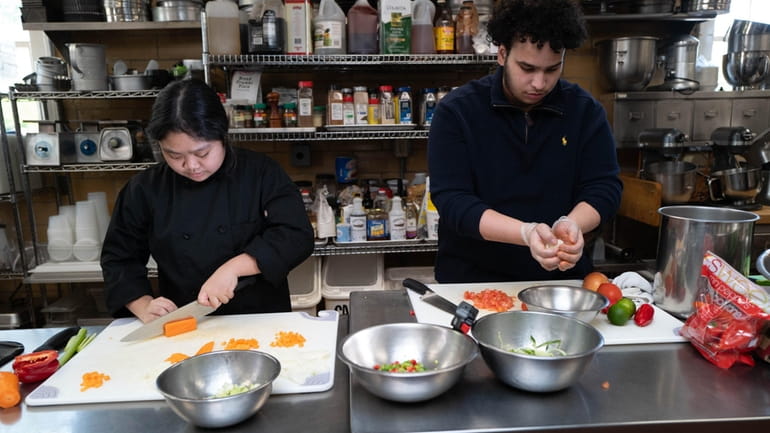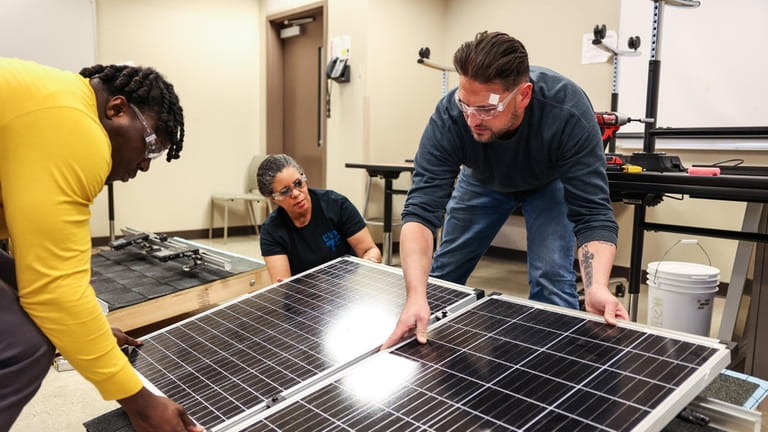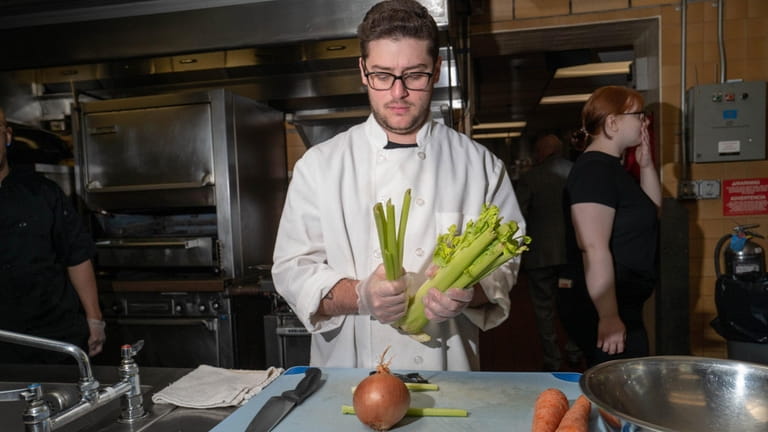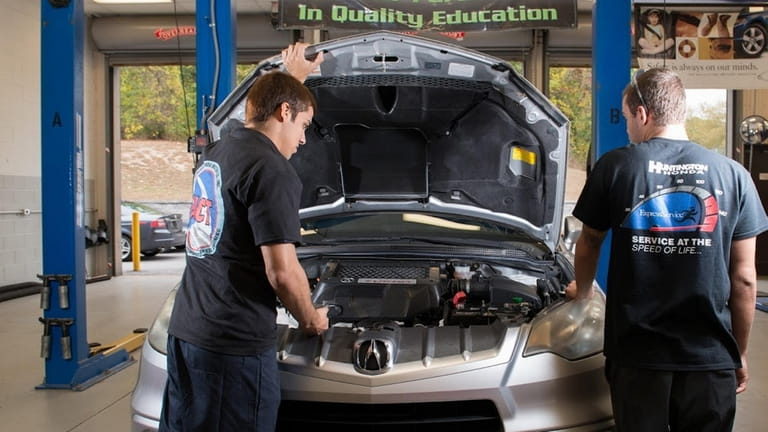Community colleges see a path forward with workforce training programs

A college student working in a heavy-equipment yard was able to get a new job as a solar panel installer. A young technician at a car dealership went for more training in his field. A communications major went back to school to become a chef.
Enrollment may have fallen in traditional academic programs at local community colleges, but the institutions see a path forward through the labor market.
Public and private funding is flowing to SUNY campuses, including community colleges, for workforce training seen as a boost to colleges and a boon to local employers.
Much of the new money from state, federal and industry sources is directed at emerging industries in renewable energy, but it's also aimed at bolstering more traditional career preparation, from culinary arts to welding and automotive repair.
WHAT TO KNOW
- Local community colleges, hurt by falling enrollment in recent years, see a path forward through the labor market.
- Among popular programs at Nassau Community College is one focused on culinary arts, while Suffolk County Community College is looking to expand its offerings in automotive technology.
- Vocational training can be obtained in two-year degree programs, or micro-credential and certificate programs lasting weeks.
Suffolk County Community College just cut the ribbon on a $21.3 million building to house classes and labs in science, math and technology, as well as renewable energy systems, cybersecurity, heating and ventilation.
Nassau Community College is preparing a new facility for its culinary arts department to open in 2025 and looking at how it can meet the labor needs of the Sands casino and resort, now edging toward approval for the nearby Nassau Hub site. The school also is expanding space for workforce and vocational training programs its administrators see as a “game-changer” for the college, where enrollment is down nearly 50% since 2010.
The college is devoting most of a $5.4 million grant to vocational and trades programs in areas such as cybersecurity and HVAC, welding and electrical.
On Friday, business advocacy group HIA-LI announced formation of a task force, co-chaired by SCCC president Edward Bonahue, to shepherd efforts to find and train workers for the 1,400 employers based at the LI Innovation Park in Hauppauge.
“We’ve taken strategic steps to shape our curriculum so that our graduates will have the skills necessary to enjoy promising careers with the businesses of the Long Island Innovation Park at Hauppauge, and other employers,” Bonahue said. He cited a new solar installer certificate program, taught by solar professionals, as an example of customized workforce development.
Millions in new state funding was recently awarded to seven SUNY campuses for offshore wind turbine technology training, research and outreach.
Workforce training has not always lived up to its promises. The Biden administration is proposing new rules to take effect next year that would assess for-profit and nondegree programs at universities and colleges on whether they burden graduates with heavy debt relative to their earnings, and whether they earn more than those with only a high school diploma.
Nassau Community College Federation of Teachers president and history professor Faren Siminoff questioned some of the workforce training offered, including a set of courses through an online company.
“Are we simply taking their money and leaving them a few thousand dollars poorer, still running in place?” she said.
Regarding the proposed collaboration between the Sands Casino and NCC, she said, "Any funding increases or facility upgrades at NCC should meet the needs of the entire community, not just a narrow sector. This is the college's mission, and any investment should keep that in mind."
However, workforce development as a component of SUNY's mission is becoming more apparent. Here are some examples of new and established vocational certificate and degree programs.

Love Makendy Chery, left, of Bellport, Vernetta Taylor of Greenport and Matthew McGuinness of Centereach fix solar panels to faux roofs in the solar tech program at Suffolk County Community College in Brentwood. Credit: Newsday/Steve Pfost
Solar installer certificate program, SCCC
Kelsey Rodriguez, 24, of Ronkonkoma, always has had to work, even as she goes to college.
She has an associate degree from SCCC and is studying for a bachelor's in psychology from Stony Brook University. But the former dock builder and heavy-equipment yard worker decided she could use a certificate in solar technology, too, and by the time she’d completed SCCC's certificate program this spring, she had two job offers.
The program kicked off last fall with 13 students and this spring saw another group graduate the 50 hours of evening classes. Students ranged from home-renovation business owners to those attracted by the ad banners in SCCC’s hallways.
“The training I got, I feel it was very hands on,” Rodriguez said. After an hour lecture, “The rest of the class was measuring, cutting … and building. We’re basically learning how to lay these solar panels on the roof and how the wiring works, which wires to use, the electrical circuits.”
Starting pay is about $18 to $20 an hour, plus she now has benefits and a 401(k), she said. She also has applied to be an electrician’s apprentice on the job so she can advance to being a lead installer.
“There’s more and more people in the world and we need more and more people to keep the world running,” she said.

Joshua Stechman of Bellmore in a cooking class at Nassau Community College. “Feeding people, that’s my favorite part,” he says. Credit: Debbie Egan-Chin
Culinary arts, NCC
Joshua Stechman, 25, of Bellmore, is already working as a line cook at a senior living residence — a job he got through school connections — and wants someday to be an executive chef.
While he has a bachelor’s degree in speech communications, cooking during the pandemic spurred him to “jump into the culinary field,” he said. “Feeding people, that’s my favorite part.”
He appreciates the knowledge and connections he’s made in the program.
“I’m always taking dishes and techniques we practice here and taking them to work,” he said.
Technically, the program is not workforce training — graduates emerge with an associate of occupational science degree — but most come out employed.
The program promises that the graduates will be ready for “entry-level culinary positions in a variety of food services facilities.”
They learn food preparation, cost analysis, human resources and marketing, front-of-the-house and back-of-the-house skills, and get experience catering college events, program coordinator Deidre Gibson said.
In addition, graduates obtain needed certificates on topics such as food-handling safety and serving alcohol responsibly.
“Students need to learn the way to advance in any business is through education,” said Anne Cubeta, chair of the Hospitality Business Department.

This fall’s incoming automotive technology program at Suffolk County Community College is expected to be its largest ever. Credit: Suffolk County Community College
Automotive technology, SCCC
The program started in 1987 when General Motors asked to partner with the college to train technicians. It since has grown to include Toyota, Honda and, to a lesser extent, other makes.
“The issue in training people in a lot of these technologies is the expense," program chairman David Macholz said. "The technology is donated [to the college], so it drives down the expense.”
The training for Toyota technicians, called T-Ten, is particularly intense, with 24 hours a week required.
Recent graduate Jack Cashman, 19, of Massapequa, worked at a Toyota dealership even before he entered the program, “just to further my education and have something on paper that said I went through the training.”
The program, he said, was “brutal … it is not for the faint of heart.” But it left him feeling more confident that he understands how and why the cars he works on perform as they do.
"What the T-Ten does is help you fix it right the first time and be confident that you are fixing it right,” Cashman said.
Typically more than 200 students are in the two-year associate degree program. This fall’s incoming class of 168 students is the largest ever, bringing the program’s size to close to 250, Macholz said, adding an additional automotive tech center is in the design phase that would double capacity. It also would have room to add marine mechanics to the curricula and expand offerings in electric vehicles.
“Transportation is one of the top economic drivers on Long Island,” Macholz said.

